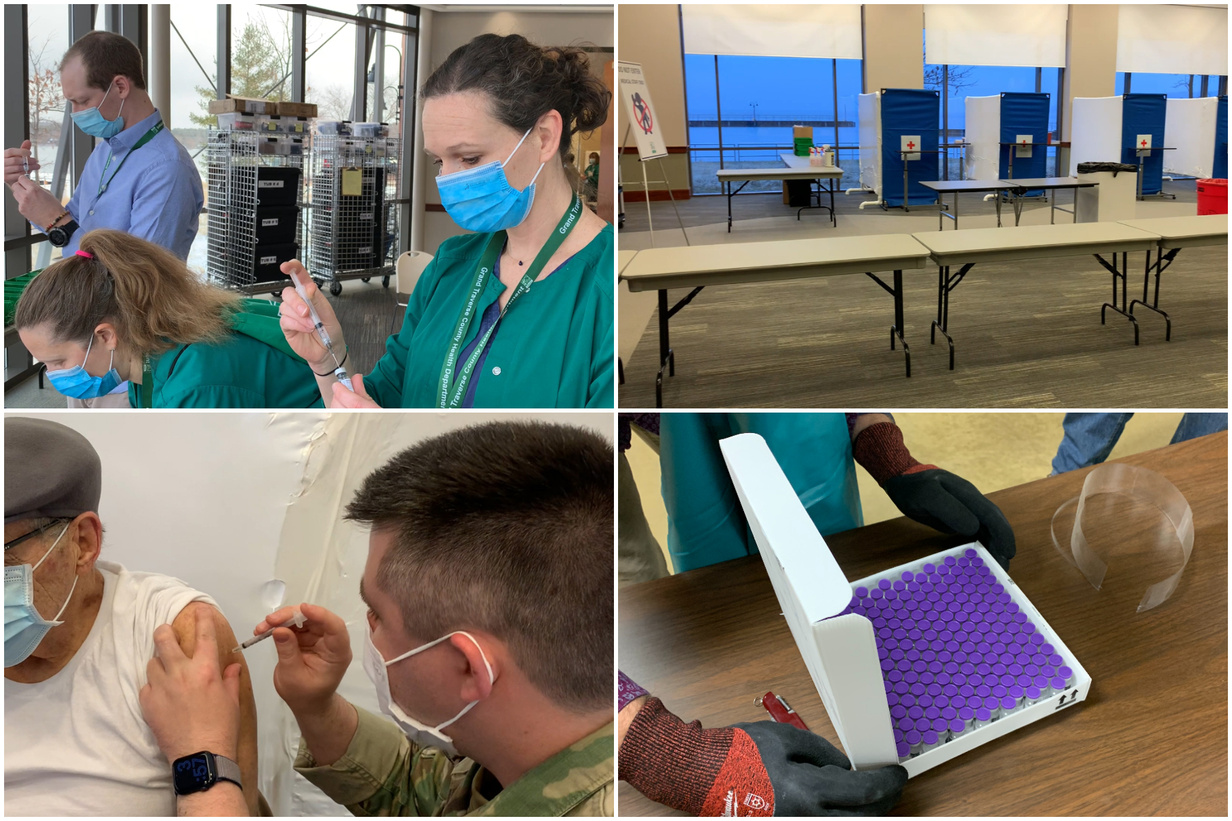
Crashed Phone Lines And New Deep Freezers: Vaccines By The Numbers
By Craig Manning | Feb. 23, 2021
It’s been more than two months since the first doses of COVID-19 vaccine arrived in northern Michigan. What’s the status of those vaccination efforts and what data tell the inside story? The Ticker crunches the numbers.
Doses administered
As of February 21, Grand Traverse County Health Department (GTCHD) has administered a total of 14,063 vaccine doses.
Given that both vaccines approved in the United States – one developed by Pfizer-BioNTech, the other by Moderna – require two doses, that figure is larger than the number of people who have received doses. According to Emmy Schumacher, GTCHD’s outreach coordinator and public information officer, GTCHD has administered 8,623 injections of the first dose and 5,440 of the second. Most of those doses are of the Pfizer vaccine, with just 600 first doses of the Moderna vaccine administered so far – though Schumacher says GTCHD is expecting more of the Moderna vaccine this week.
At Munson Healthcare, Dale Killingbeck – senior specialist for media relations and corporate communications – says the healthcare system has so far “supplied over 29,000 doses of vaccine to both staff and community members.”
Freezer space
While the Moderna vaccine can be maintained at a fairly typical vaccine storage temperature, the makeup of the Pfizer vaccine requires that it be stored in an ultra-cold freezer, at temperatures between -80°C and -60°C (-112°F and -76°F). Those colder temperatures, combined with the fact that northern Michigan has received significantly more Pfizer vaccines so far, meant that local hospitals and health departments had to invest in new equipment to keep the vaccine doses stable.
Hospitals throughout the Munson Healthcare system have purchased ultra-freezers for that specific purpose, including a 28-cubic-foot freezer at Munson Medical Center that Killingbeck says is capable of storing “several thousand doses of the Pfizer vaccine.”
GTCHD, meanwhile, has vaccine storage capacity “sufficient to handle allocations greater than 10 times the current and projected allocations,” according to Schumacher. The deep freezer, provided to GTCHD by the Michigan Department for Health and Human Services, is big enough that GTCHD has “received Pfizer vaccine for two neighboring health departments and then distributed it to them as they utilized it or needed it.”
Shipments and logistics
The biggest challenge for planning vaccination outreach in northern Michigan? The inconsistency of vaccine shipments. Both GTCHD and Munson expect to receive vaccine shipments on about a weekly basis, but those shipments can vary in reliability and size.
Since vaccines started shipping the week of December 13, Killingbeck says shipments to Munson Healthcare have “varied from zero to 7,000 doses, depending on the week.” Some of that variance is due to shifts in vaccination phasing: With most northern Michigan healthcare workers now vaccinated, Munson’s shipments have gotten smaller in recent weeks as vaccine allocations “shift to health departments and retail.”
At the beginning of the month, Munson Healthcare announced it was temporarily putting its vaccination clinics on hold due to shortages in supply. The healthcare system has not resumed scheduling new appointments since, though Munson is slated to share an update on its vaccine efforts today (Tuesday).
GTCHD has received eight shipments so far. Some weeks those shipments are just the first dose; sometimes just the second dose. Some weeks they include both. One week, GTCHD got no shipment at all. Schumacher says this variability – plus the short notice GTCHD gets when a new vaccine shipment is on the way – makes it challenging to plan vaccination appointments or clinics.
“We find out on Fridays, mid-day, about what vaccine we will receive for the following week,” Schumacher tells The Ticker. “Then clinic appointment schedules and staffing schedules need to be built. That is why we shifted to rolling out appointments on Mondays. We were getting the information mid-afternoon on Friday and it wasn’t feasible to effectively roll out the appointments to the public on the same day.”
Manpower
The logistical challenges of rolling out a massive vaccination campaign require a sizable team of employees and volunteers to shoulder the work.
TCHD has an 11-person “incident command team” leading its coordination, plus a “mass vaccination site command team” at the Hagerty Center made up of 10 people. On a busy vaccination clinic day, Schmacher says GTCHD has “about 80 people total” on deck, including 46 Health Department staff, 10-12 volunteers, the 10-person site command team, and half a dozen two-person National Guard teams.
Munson Healthcare, meanwhile, has “an interdisciplinary team of 90-100 people across the healthcare system coordinating our vaccination efforts,” according to Killingbeck.
The web and phone crush
Local demand for the vaccine is high, as indicated by the influx of web traffic, phone calls, social media activity, and other inquiries local hospitals and health departments are receiving.
As of February 12, Munson Healthcare had received 26,647 calls to its vaccine hotline, with “many more” coming into other departments or practices throughout the healthcare system.
Schumacher says GTCHD is currently fielding “40-50 calls per day to our front desk regarding either first or second dose scheduling appointment inquiries.” GTCHD has also tracked approximately 600 emails to its dedicated COVID vaccine email address since the address was set up, along with “hundreds more to incident command staff from community members, leaders, etc.”
For the Area Agency on Aging of Northwest Michigan (AAANM), the sheer number of vaccine inquiries was enough to crash a hotline. In January, as Michigan moved to a new phase of vaccination eligibility that included senior citizens, AAANM teamed up with United Way to launch what AAANM Executive Director Heidi Gustine describes as “a dedicated line for seniors to call to get on [vaccination] scheduling lists.”
Gustine says the hotline was “probably the first in the region to go up” that served older adults specifically. As Munson Healthcare and local health departments worked to get their own systems for senior outreach in place, AAANM’s hotline fielded calls from throughout its 10-county service radius, and beyond. The line quickly “became a go-to focal point for older adults” seeking vaccination information in northern Michigan, which Gustine says pushed the call center beyond its capacity. She estimates that the line – now up and running once more – has received approximately 22,000 calls since it went online in early January.
Comment






